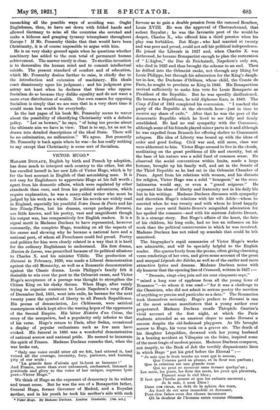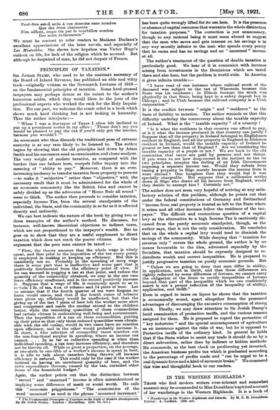VICTOR HUGO.*
Menem DucLeux, English by birth and French by adoption, has done much to interpret each country to the other, but she has excelled herself in her new Life of Victor Hugo, which is by far the best account in English of that astonishing man. It is not easy for Englishmen to appreciate Hugo at his full worth ; apart from his domestic affairs, which were regulated by other standards than ours, and from his political adventures, which require explanation, he was a many-sided writer who must be judged by his work as a whole. Now his novels are widely read in England, especially his youthful Notre Dame de Paris and his late Ninety-Three, but his dramas, except perhaps Hernani, are little known, and his poetry, vast and magnificent though his output was, has comparatively few English readers. It is a signal merit in Madame Duclaux to have represented, however summarily, the complete Hugo, touching on all the aspects of his career and showing why he became a national hero and a national poet, of whom all Frenchmen could feel proud. Poetry and politics for him were closely related in a way that it is hard for the ordinary Englishman to understand. His first drama, Marion de Lorne, was proscribed because of its political allusions to Charles X. and his minister Villele. The production of Hernani in February, 1830, was made a Liberal demonstration against the old Monarchy, as well as a Romantic demonstration against the Classic drama. Louis Philippe's family felt it desirable to win over the poet to the Orleanist cause, and Victor Hugo's acceptance of a peerage was thought to strengthen the Citizen King on his shaky throne. When Hugo, after vainly trying to organize resistance to Louis Napoleon's coup rl'Etat of December 2nd, 1851, went into exile, he became for the next twenty years the symbol of liberty to all French Republicans. His poems of denunciation, Les Chltiments, were satirical masterpieces which kept alive the waning hopes of the opponents of the Second Empire. His bitter Histoire d'art Crime, the story of the usurpation, had a popularity only inferior to that of his verse. Hugo's return to Paris, after Sedan, occasioned a display of popular enthusiasm such as few men have evoked. His funeral in 1885 was a wonderful demonstration of national sorrow and national pride. He seemed to incarnate the spirit of France. Madame Duclaux remarks that, when the war broke out, "Only one voice could utter all we felt, had uttered it, had voiced all the courage, intensity, fury, patience, and burning pity of our souls: 'La grande tune d'airain qui la-haut as lamente ! ' And France, more than ever entranced, enchanted, listened in gratitude and glory to the voice of her unique, supreme lyric poet—Victor Hugo."
We think of Hugo as the exponent of democracy in its widest and truest sense. But he was the son of a Bonapartist father, General Hugo, former Governor of Madrid, and a Royalist mother, and in his youth he took his mother's side with such
•
Victor Hugo. By Madame Duclaux. London: Constable. (14s. net.]
fervour as to gain a double pension from the restored Bourbon, Louis XVIII. He won the approval of Chateaubriand, that
ardent Royalist ; he was the favourite poet of the would-be despot, Charles X., who offered him a third pension when his play was forbidden. But Hugo . who had married at twenty and was poor and proud, could not sell his political independence. He joined the Liberals in 1827 and, when Charles X. was dethroned, he became Bonapartist enough to plan the restoration of " L'Aiglon," the Due de Reichstadt, Napoleon's only son, who died in 1832 and thus brought the scheme to an end. Then he drifted into the Orleanist ranks, not through any liking for Louis Philippe, but through his admiration for the King's daugh- ter-in-law, the Duchess° d'Orleans, whose child, the Comte de Paris, he sought to proclaim as King in 1848. His Bonapartism revived sufficiently to make him vote for Louis Bonaparte as President of the Republic. But he was speedily disillusioned. He became a Republican, he told Alphonse Karr, in 1849. The Coup d'itat of 1851 completed his conversion. "I reached the party of the Republic at the eleventh hour—just in time to receive my share of exile." After that he was the poet of the democratic Republic which he lived to see fully and firmly established. He had no real sympathy with the Commune, although some of his friends played minor parts in it and although he was expelled from Brussels for offering shelter to Communist refugees. His idea of Liberty was bound up with the ideas of order and good feeling. Civil war and, still more, class war were abhorrent to him. Victor Hugo seemed to live in the clouds, meditating on the great problems of life and eternity, but at the base of his nature was a solid fund of common sense. He observed the social conventions within limits, made a large fortune, brought up his family well, and sat in the Senate of the Third Republic as he had sat in the Orleanist Chamber of Peers. Apart from his relations with women, and his distaste for religion, Victor Hugo was a solid "bourgeois," as the revo- lutionaries would say, or even a "grand seigneur." He expressed his ideas of liberty and fraternity not in his daily life but in his writings. Madame Duclaux discusses with sympathy and discretion Hugo's relations with his wife Adele—whom he married when he was twenty and with whom he lived happily for nine years until Sainte-Beuve's misguided admiration for _ her spoiled the romance—and with his mistress Juliette Drouet. It is a strange story. But Hugo's affairs of the heart, the fate- of his children, his long exile, had no less an influence on his work than the political controversies in which he was involved. Madame Duclaux has not raked up scandals that could be left unnoticed.
The biographer's rapid summaries of Victor Hugo's works are admirable, and will be specially helpful to the English reader. She quotes freely from the poems, often giving charming verse renderings of her own, and gives some account of the great and unequal Legende des &ides, as well as of the earlier and more attractive lyrics and dramas. Madame Duclaux notes with sly humour that the opening line of Cromwell, written in 1827 :—
"Domain, vingt-cinq juin mil six cent cinquante sept,"
"raised a long roar of applause from all the young lions of Romance "—to whom it was read—" for it was a challenge to the Classicists, who did not admit in serious poetry the mention of anything so precise and particular as a date." The Romantics took themselves seriously. Hugo's preface to Hernani is one of the most solemn manifestoes that a young author ever perpetrated. Madame Duclaux recalls Theophlle Gautier's vivid account of the first night, at which the Paris students attended as an amateur claque to make Hernani a success despite the old-fashioned playgoers. As life brought sorrow to Hugo, his verse took on a graver air. The death of his daughter Leopoldine, drowned with her young husband in a boating accident at Villequier on the Seine, inspired some of the most tragic of modern poems. Madame Duclaux compares, not inaptly, to the Book of Job the terribly dispassionate lines
in which Hugo "put his grief before the Eternal" :—
"Jo sais quo le fruit tombs au vent qui le **cone,
Quo l'oiseau peed sa plume, et la flour son parfum ; Que la creation eat une grand° roue
Qui ne pout se mouvoir sans &rases quelqu'un ;
Les mois, lea jours, lea flots des mere, les yeux qui pleurent,
Passent sous lo ciel bleu ; II faut que l'herbe rune et quo lea enfanta meurent ; Je le sant, 6 mon Dieu!
Dana vol deux, au delã de la sphere des flues, Au fond de cot azur immobile et dormant, Peut-etre faites-vous des choses inconnues
Oh in douleur de l'homme entre comme element.
Peut-atre eat-il utile a vos desseins sans nombre Qua des Urea charmants Wen aMent, empo tee par is tourbillon sombre Des noire &Memento."
We must be content to refer readers to Madame Duclaux's excellent appreciations of the later novels, and especially of Lee Miserable& She shows how hopeless was Victor Hugo's outlook on life, for lack of the religion which he scorned. But although he despaired of man, he did not despair of France.



































 Previous page
Previous page